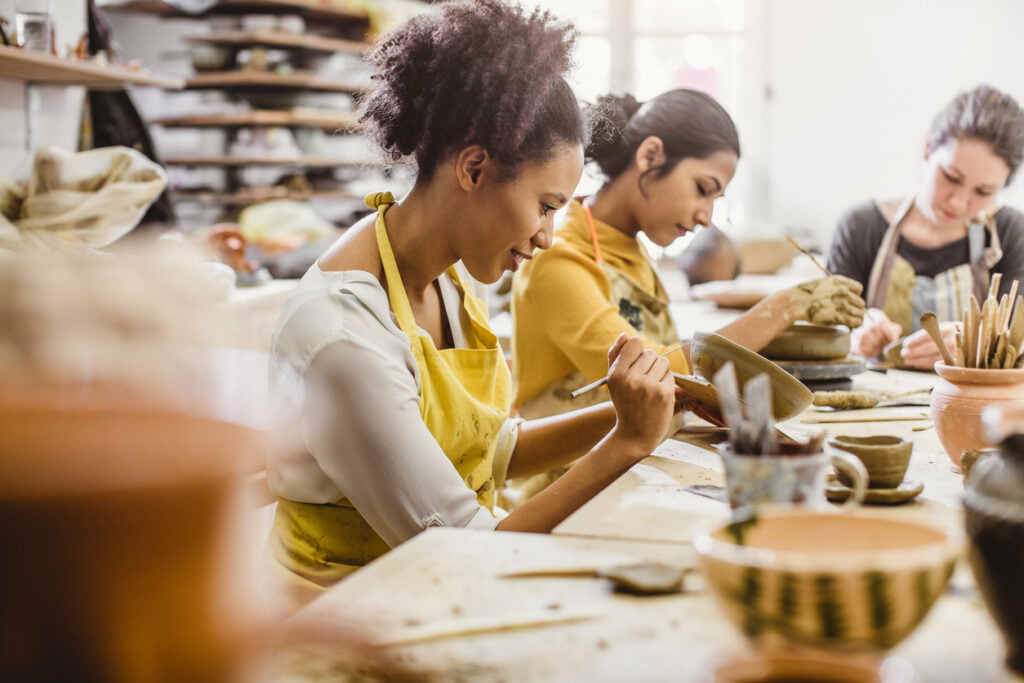The journey to sobriety tests individuals’ resolve and resilience. Artistic expression helps build and maintain resilience. Engaging in creative activities like painting, music, or writing helps process emotions and experiences in a healthy way. This leads to a deeper understanding of oneself and their journey, contributing to a more sustainable recovery.
Individuals in recovery can gain several benefits from artistic expression. By expressing themselves creatively, they can process their emotions and experiences. This helps them understand their journey better. Artistic expression also fosters a sense of self-awareness, which is crucial for recovery.
Key Takeaways
- Artistic expression is a powerful tool for healing and growth in recovery, promoting emotional processing and self-awareness.
- Creative outlets like painting, music, or writing can help manage stress and anxiety, reducing cravings and triggers.
- Engaging in artistic activities fosters a sense of accomplishment and pride, essential for building self-esteem and confidence in recovery.
- Artistic expression can bring individuals together, creating a sense of community and belonging, crucial for building resilience in sobriety.
- Incorporating artistic expression into the recovery process can enhance resilience and overall well-being, leading to a more sustainable recovery journey.
Overcoming Sobriety Challenges
Overcoming sobriety challenges is an inevitable part of the recovery journey. Individuals in recovery face numerous hurdles, including managing cravings, dealing with triggers, and traversing relationships. It is essential to acknowledge that these challenges are a normal part of the process and that seeking support is a sign of strength, not weakness.
Building resilience in sobriety requires a multifaceted approach that incorporates physical, emotional, and spiritual well-being. Developing coping skills and strategies is vital in managing stress and anxiety, which can trigger cravings. Engaging in regular exercise, practicing mindfulness, and establishing a strong support network can greatly contribute to an individual’s ability to overcome sobriety challenges.
Embracing a growth mindset and recognizing that setbacks are opportunities for growth can also help individuals in recovery build resilience. By acknowledging and addressing underlying issues, individuals can develop a deeper understanding of themselves and their addiction, ultimately leading to a more sustainable and fulfilling recovery. By leveraging these strategies, individuals can effectively overcome sobriety challenges and achieve long-term success in their recovery journey.

Artistic Expression in Recovery
As individuals build resilience in sobriety, they often discover new ways to channel their emotions and experiences into meaningful expressions. Artistic expression in recovery can be a powerful tool for healing and growth. Through creative outlets such as painting, music, or writing, individuals can process their emotions and experiences, gaining a deeper understanding of themselves and their journey.
Artistic expression can also provide a sense of accomplishment and pride, which is essential for building self-esteem and confidence in recovery. By tapping into their creative side, individuals can:
- Explore their emotions: Artistic expression allows individuals to explore their emotions in a healthy and constructive way, helping them to better understand themselves and their experiences.
- Develop self-awareness: Creative activities can help individuals develop a greater sense of self-awareness, enabling them to recognize patterns and behaviors that may be hindering their recovery.
- Enhance self-expression: Artistic expression provides a means of self-expression, allowing individuals to communicate their thoughts and feelings in a unique and meaningful way.
- Foster a sense of belonging: Creating art can bring individuals together, fostering a sense of community and belonging, which is essential for building resilience in sobriety.
Building Resilience in Sobriety
Building resilience in sobriety requires a multifaceted approach, one that incorporates various strategies to foster emotional, mental, and spiritual growth. This process is pivotal for individuals who have struggled with addiction, as it enables them to navigate life’s challenges without relying on substances. By cultivating resilience, individuals can develop a stronger sense of self, improve their relationships, and enhance their overall well-being.
In the context of building resilience in sobriety, a key consideration is acknowledging the importance of self-care, social support, and personal growth. Engaging in activities that promote relaxation and stress reduction, such as meditation or yoga, can help individuals manage triggers and cravings. Building a strong support network of peers, family, and friends is also indispensable, as it provides a sense of belonging and connection. In addition, pursuing hobbies and interests that bring joy and fulfillment can help individuals develop a sense of purpose and identity outside of their addiction. By adopting these strategies, individuals can build resilience in sobriety, ultimately leading to a more fulfilling and meaningful life. By incorporating artistic expression into this process, individuals can further enhance their resilience and overall well-being.
Creative Coping Mechanisms Matter
Engaging in creative activities serves as a powerful adjunct to traditional coping mechanisms, offering individuals in recovery a unique outlet for processing emotions and managing stress. Creative coping mechanisms matter in building resilience in sobriety as they provide a healthy distraction from cravings and negative thoughts.
Incorporating creative activities into one’s daily routine can have a profound impact on overall well-being. Some examples of creative coping mechanisms include:
- Journaling and writing: Expressing thoughts and feelings through writing can help process emotions and gain clarity.
- Drawing and painting: Creating visual art can provide an outlet for emotions and reduce stress.
- Music and dance: Engaging in musical or dance activities can boost mood and provide a sense of accomplishment.
- Crafting and DIY projects: Creating something with one’s hands can provide a sense of purpose and fulfillment.
Healing Through Art Therapy
Art therapy can take many forms, including painting, drawing, sculpting, and other creative activities. The goal of art therapy is not to create a masterpiece but rather to facilitate the healing process. By engaging in art therapy, individuals in recovery can develop a greater sense of resilience, which is essential for building resilience in sobriety. As individuals explore their creativity, they can develop a more positive and hopeful outlook on life, leading to improved mental health and well-being. By incorporating art therapy into their recovery plan, individuals can experience a deeper sense of healing and growth.
Frequently Asked Questions
Can I Still Be Creative if I’m Not Artistic?
Creativity is not exclusive to artistic individuals. Anyone can tap into their creative potential through various forms of expression, such as writing, music, or problem-solving, regardless of their artistic inclination or skill level.
How Does Art Therapy Differ From Art Classes?
Art therapy and art classes diverge in purpose and approach. Art therapy focuses on emotional expression and healing, led by a licensed therapist, whereas art classes emphasize technical skill development and artistic technique instruction.
What Are Some Non-Traditional Art Forms for Sobriety?
Exploring non-traditional art forms can be a powerful tool in building resilience in sobriety. Consider alternatives like slam poetry, spoken word, or even graffiti, which can provide an emotional outlet and foster creative expression.
Can Artistic Expression Trigger Sobriety Setbacks?
Artistic expression can potentially trigger sobriety setbacks if not approached mindfully. Intense emotional releases or nostalgic associations with substance use may arise, emphasizing the importance of a supportive environment and personal reflection in creative endeavors.
Do I Need to Share My Artwork With Others for It to Be Helpful?
While sharing artwork can foster connection and accountability, it’s not a requisite for therapeutic benefits. Personal expression, reflection, and self-awareness can be powerful tools in building resilience in sobriety, even in solitude.
Conclusion
Engaging in artistic expression is an essential component of building resilience during sobriety. By providing an outlet for processing emotions and experiences, creative outlets foster a deeper understanding of oneself and their journey. This, in turn, enhances stress and anxiety management, reducing the likelihood of cravings and setbacks. Artistic expression plays a pivotal role in developing a sense of purpose and identity outside of addiction, ultimately contributing to a more sustainable and fulfilling recovery.




